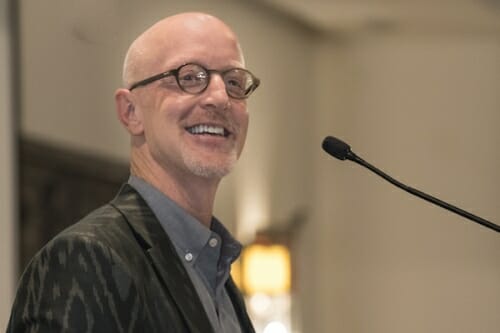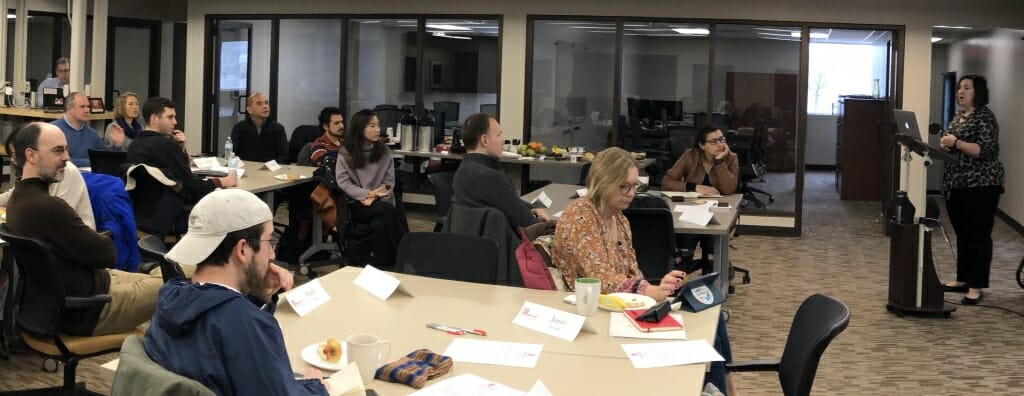Partnership fosters entrepreneurship that has social impact
Entrepreneurship can be measured in more than just financial success, says the leader of an effort to incorporate solving social problems into entrepreneurial ventures in UW–Madison’s Discovery to Product program.
Jeff Snell, who joined the Division of Continuing Studies in 2019, is collaborating with D2P to add a “social impact entrepreneurship” component to its coaching and support of aspiring entrepreneurs across campus.
Snell will be a mentor for projects accepted into D2P’s Innovation to Market and Igniter programs. For the last four months he’s been working with D2P staff to review and update the curriculum to ensure that social innovators and change makers feel as much at home in the program as traditional entrepreneurs.

“I’m excited to offer my experience in support of a social impact call to action through D2P,” says Jeff Snell. Photo: Gabriella Marks
Applications to D2P’s Innovation to Market and Igniter programs are due on Jan. 27. The teaching team is hosting two open house events leading up to the deadline to share an overview of programs and answer questions.
Social innovation differs from social work, says Snell, who once worked with a youth program in Milwaukee. “Social innovation is a field dedicated to solving social problems,” Snell explains. At the youth program, “we weren’t attacking the root causes of the problems; we were managing the symptoms.”
“We were stuck in managing the multi-generational cycle of poverty and illiteracy. I kept thinking, what would it look like to try to work yourself out of a job by attacking those causes, not aiding and abetting the systemic dysfunction?” he says. “The mind shift from management to solution is profound, and it’s really at the core of good social innovation.”
“It’s one thing to research the problem, and cite how bad things are, and different to actually be a part of a solution,” says Snell.
Snell was an entrepreneurial mentor for the National Science Foundation’s I-Corps Program, and co-founded a social innovation executive program that included development of a social enterprise business model awarded a MacArthur Fellowship in 2016. He also established Marquette University’s nationally recognized Social Innovation Initiative — one of the first institutions to be recognized as part of the Ashoka Changemaker Campus program, a global certification program for social entrepreneurship.
The Marquette program created space for faculty, staff and students to congregate around the institution’s shared Jesuit values of excellence, faith, leadership and service, Snell says. “It was a way to say, ‘Your passions, your interests — don’t apologize for those. Let’s figure out how you’re going to discover a really rich life, by just being who you already are and applying that to the world around you.’”
“When you find and connect with a community of people who are motivated by the same kinds of value creation, it’s powerful. The importance of that shared sense of belonging and mutual inspiration can’t be overstated.”
Jeff Snell
Since arriving at UW–Madison, Snell says he has observed how seamlessly the tenets of social innovation correlate to the Wisconsin Idea. “You see empathy and humility, relentless curiosity, purposefulness … and the resonance with social innovation is just so deep.”
“We’re excited to have Jeff’s insights and support as we reach out to social entrepreneurs in a more intentional way,” says D2P director Andy Richards. “In many ways, if we do our work well at D2P, it creates one more portal for people to share their work with society. Entrepreneurship can take many shapes — in fact, for many campus innovators, profit is not the driving factor. It’s more so the passion for solving a problem and leveraging the power and knowledge of the university to create value for society and the world.”
“The beauty of this collaboration is that it really illustrates the flexibility of the model that guides our curriculum,” explains D2P innovation and commercialization specialist Cecily Brose. “Because it’s so user-driven and discovery-based, it’s provided a really solid foundation to expand our program’s support for social impact business models.”

D2P’s Cecily Brose lends insights to course participants informed by her career leading product and packaging development in the food and consumer products industry. Photo: Jen Kobylecky
Snell emphasizes that social impact entrepreneurship is not a new concept at UW–Madison, pointing to many people and programs that have been working in this space for some time.
“I think about the Global Health Institute, the Wisconsin Alumni Research Foundation’s Force for Positive Change event, Rich Halverson in Education, who just launched a new course about innovative models to deliver education to populations facing challenges across the country and the world, John Surdyk’s work in the Weinert Center to connect students with the Clinton Global Initiative, and Michelle Kwasny in the School of Human Ecology and her work with design thinking, just to name a few,” he says, “and that’s just scratching the surface.”
While D2P, a program within the Office of the Vice Chancellor for Research and Graduate Education, has supported social impact-focused projects in the past, it has not had the capacity to offer mentoring tailored to this space.
“I’m excited to offer my experience in support of a social impact call to action through D2P,” says Snell. “When you find and connect with a community of people who are motivated by the same kinds of value creation, it’s powerful. The importance of that shared sense of belonging and mutual inspiration can’t be overstated.”
Adds continuing studies Dean Jeff Russell: “This collaboration with D2P is an example of how DCS seeks to facilitate and convene the work of others on campus so their contributions are all the more beneficial to the state, the region and the world, per the Wisconsin Idea. We’re hopeful this will add value to ongoing and new efforts, and that good results will follow.”




